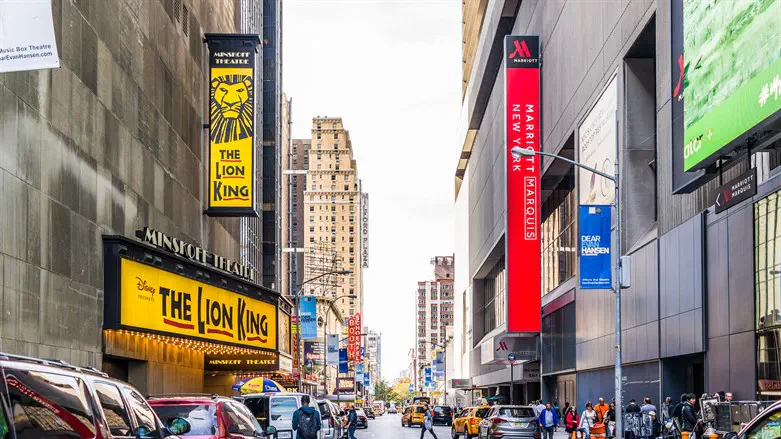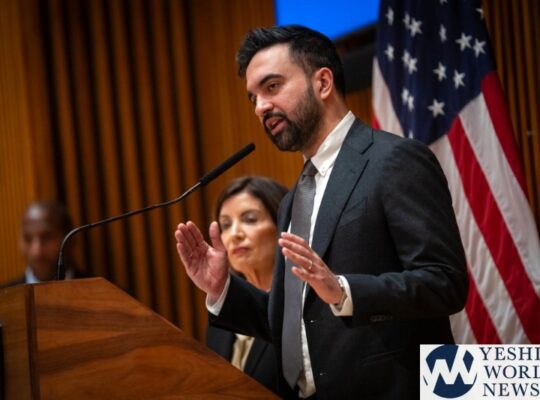
It is not just Jewish existence that is now threatened in New York, but the very spirit and vitality that made New York the greatest city in the world
Much has been written about the impending pall unto threat that faces Jewish life in New York. Naturally much of that focus has been on the blatant hatred of Israel that Mamdani and his fellow travelers gleefully espouse.
As any sentient being soon realizes, hatred of Israel, and Mamdani’s unwillingness to accept Israel as a Jewish state, reveal a singular discrimination against Jewish self-determination, which is just garden variety anti-Semitism.
But there is unfortunately much more to Mamdanitis.
Mamdani’s great rallying cry to his Millennial and Gen Z acolytes was about affordability. The cost of housing is high, the cost of living is high, and you are not able to cut it.
This is a sugar coated rendition of the woke need for equal outcomes. If I can’t afford it, it must be made affordable to me, not my having to afford something less until I amass the means to afford something more.
Of course, this is the great betrayal of what New York was always about. “If I can make it there, I’ll make it anywhere” bespoke the challenge and thrill of what it meant to live in New York.
New York was the great entrepreneurial enterprise. Storefronts were startups, dress racks were computer programs, and no one thought they were entitled to anything but the opportunity to make it there.
This was not a romantic nor heroic quest, but a way of life that beckoned and dared people to make of New York and of themselves as they could.
For Jews particularly, New York represented a tectonic shift from life in Europe and the Levant. Jewish life there had been constricted, restricted, limited and subject to random and consistent appropriation.
The promise represented by Miss Liberty in the New York harbor was not just an aspiration, or a come on. It was real: here you can make of yourself what you are able to. Here the door is open for you.
Of course, not everyone could make it in New York. That was true from its earliest days. New York was shrewd, hard, unforgiving and not terribly sympathetic. People left looking for calmer, less intense pastures.
And those who subsequently arrived were often looking for the chance, the dare, the opportunity to play in an arena that was unlike anything anywhere else.
All of this sounds very anachronistic now. As anachronistic as JFK’s inaugural address to “ask not what your country can do for you; ask what you can do for your country.”
Mamdani and the Democratic Socialists want to not only ask, but to insist and yes, demand, what their city can do for them.
They are all about normalizing whatever situation they find themselves in. Oh, I am working in the arts getting paid little: of course, my rent should be more appropriate for my means.
There seems to be little awareness, not to mention acceptance, that falling short of your own material desires is not somehow someone else’s fault. For millions of New Yorkers for generations there was that awareness, and so they moved, initially to suburbs and then to lower cost and lower tax states.
There was always an implicit understanding that New York worked according to its own user’s manual, its own rule book. It was unusual, possibly unique. Never the easiest, and not always the most sympathetic, but a place of dynamism and opportunity.
Younger people might now say that the opportunities are more limited, but that might reflect a lower tolerance for striking out for oneself, for taking risks and assuming unknowns. Or just plain assuming that I am entitled to have everything laid out for me.
Ultimately, the spurning of Israel and Jews and the insistence on the City accommodating itself to the entitled set are of a piece: resentment for those who have succeeded on New York’s terms and an insistence that the terms must change.
Jews control everything, so it is no surprise that I have nothing. Israel is determining our direction and fate in the US, and therefore I have no opportunity for a fair and full life.
This is the rallying cry of the sniveling, the loser who resents those who have done well. Traditionally the poor have not resented the rich; they have wanted to become like them.
But the Mamdanistas see only a zero-sum game: what you have I can never achieve. So why should you have it?
History might very well recall that New York’s demise was rooted in the cost to its success: that the ever-increasing cost of living in New York drove out many who were the bedrock of the City: working and middle class ethnics from around the world.
New York was the meeting place of people of all backgrounds who shared the dream of making it for themselves and their families. They worked hard, and became increasingly frustrated by high taxes, constricting regulations, and an increasingly unattractive trade off of what they had to pay for what they received.
But the difference between then and now is that people then did not blame New York. It was just the way it was. Part of the warf and woof of this amazing place.
But today, it is New York who must accommodate the young and the demanding. If I can’t make it there, it’s New York’s fault and responsibility to make sure that I do, they whine.
As they say on Broadway, New York had a great run. Sadly, you can see the lights dimming, the curtain descending.
Douglas Altabef is the Chairman of the Board of Im Tirtzu and a Director of the Israel Independence Fund
Source link












